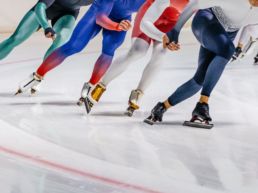International Federations (IFs) are changing their approach to digital strategies. This is highlighted in our SportOnSocial International Federations 2025 Report which examines the origins and possible direction of these changes.
While some IFs continue to focus on scale – more content, more channels – the most effective strategies in 2024 concentrated on the people and systems driving long-term value, i.e. athletes and technology.
We noted that leading IFs from overall SportOnSocial IFs 2025 rankings were investing in athlete empowerment through digital education, safeguarding tools and real-time content access. Additionally AI tools began to play a growing role in improving content delivery, sharing and management, especially during high-pressure events such as Paris 2024.
This article outlines two of the most impactful strategic trends from 2024 that IFs can use to support sustainable growth and foster more authentic audience connections: athlete empowerment and AI usage.
1. Athlete empowerment is becoming a digital priority for IFs
Nowadays athletes often have a larger digital following than their IF. Their ability to connect with fans across regions, languages and platforms makes them an invaluable part of any sport’s digital ecosystem.
Several IFs took deliberate steps in 2024 to empower their athletes online. The initiatives did not focus merely on pushing scripted storytelling; they also made athletes feel supported and equipped to manage their digital presence safely, authentically and sustainably.
World Athletics, which topped the SportOnSocial IFs 2025 rankings, implemented AI-driven safeguarding tools to protect athletes from online abuse. This kind of digital safety net encourages athletes to engage online with added confidence and consistency, ultimately boosting their visibility and that of their IF.
The Badminton World Federation (BWF) climbed 34 places on TikTok and ranked 8th place overall on SportOnSocial IFs 2025. BWF prioritised digital education by partnering with star athletes like Viktor Axelsen and PV Sindhu to strengthen their understanding of content creation and social media strategy. Partnerships with other content creators often resulted in particularly relatable and impactful content, notably in growth markets.
Moving forwards: how IFs can implement change
- Establish athlete digital education programmes: offering tailored workshops/online resources for athletes for them to gain a better understanding of platform algorithms, personal branding, content formats, and audience engagement strategies.
- Invest in cyber safeguarding tech: implementing AI-driven moderation tools to protect athlete accounts/maintain a safe online space.
- Support content partnerships: facilitating collaborations between athletes and trusted creators/media partners/internal production teams to co-create high-quality content.
- Build a digital support structure: providing athletes with guidance on branding, analytics and content planning so athletes can develop their platforms while benefitting your sport.
2. AI can streamline digital operations
AI adoption is growing significantly as many IFs begin implementing it to (i) speed up content delivery, (ii) reduce manual workloads, and (iii) support more meaningful fan and athlete engagement.
FIBA ranked 5th overall on SportOnSocial IFs 2025, used AI to automate aspects of its digital production – freeing up teams to concentrate on higher-value creative and strategic work. Such efficiency is increasingly necessary as the demands of content creation continue to increase.
World Aquatics, ranked 2nd overall on SportOnSocial IFs 2025, gave a fascinating glimpse into how AI can directly empower athletes. During Paris 2024, they used AI-driven systems to provide athletes with real-time event footage. This access enabled athletes quickly to share high-quality content on their channels, creating better alignment with live action and a more immediate connection with fans on one of the sport’s biggest stages.
Beyond workflows, AI is helping IFs make the digital environment safer. Tools like automatic moderation systems are used to flag and remove harmful comments, creating healthier spaces for athletes to engage in and build their online presence.
How IFs can implement AI
- Identify repetitive tasks for AI automation: looking at editing/translations/ captioning/asset formatting, in fact any area where AI can free up time for creative/strategic thinking.
- Deploy AI-powered asset delivery systems: ensuring athletes/media teams have near-instant access to in-event photos/videos for faster, more compelling digital activation.
- Use AI moderation for online safety: investing in platforms that can automatically detect, filter and report abusive/inappropriate comments and help protect athlete/community health.
- Experiment with AI-led personalisation: exploring tools that tailor content for various audiences based on language/location/fan behaviour.
A couple of final thoughts
1. Some of the policies adopted in 2024 indicate the future direction of digital strategies in sport. IFs that focus on empowering athletes and using technology more effectively are the ones experiencing positive results, in content performance and in stronger relationships with fans and talent alike.
2. These changes haven’t involved large-scale transformations; instead, they’ve been tactical shifts that other IFs can explore and adapt. Whether offering digital education, using AI for safer online spaces or delivering faster access to content, the opportunity is obvious: support the individuals who drive your sport, use AI strategically … and growth will follow.
SportOnSocial Reports
These reports rank sports based on their digital performance.
Using an extensive mix of social media and search data, we have also produced customised SportOnSocial Reports for a range of rightsholders, sports and events (e.g. IFs, global sports properties, the Tour de France, Giro de Italia, La Vuelta, Tokyo 2020 and the 2022 FIFA World Cup).
Now in its 9th year, the SportOnSocial International Federations Report is widely regarded as one of the leading digital benchmarking tools in Olympic sport.





